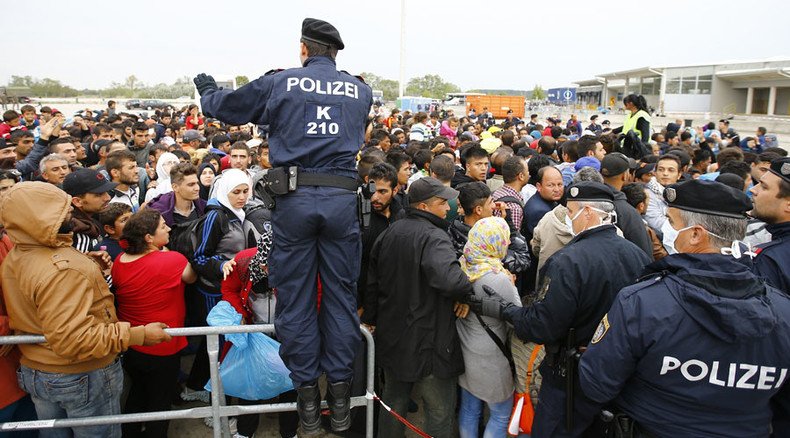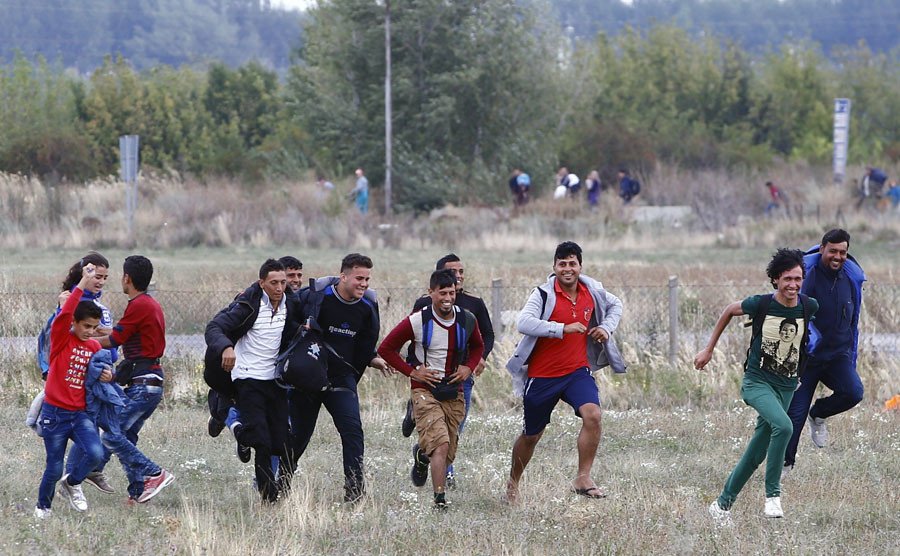EU refugee crisis threatens 'de-facto collapse of Schengen system'

As one EU member state after another introduces controls that effectively reintroduces national boundaries, the European system of free movement is at risk, says former European Parliament member Glyn Ford.
Germany has technically backed out of the Schengen zone which allows freedom of movement between European states, now its border with Austria is being strictly guarded by police. The move follows the arrival of an unprecedented number of refugees over the weekend. Meanwhile Austria has announced it is sending troops to its border with Germany, and Hungary has already deployed troops and built fencing to halt refugees arriving from Serbia.
RT: The map of Europe shows plenty of border controls already in place. Is the whole Schengen agreement in jeopardy?
Glyn Ford: Two things: the free movement of the goods and services, capital and people, only allowed free movement of, if you want, ‘legal’ people. So, in that sense I don’t see Schengen is undermined. But nevertheless, this is a very serious issue which is demonstrating that unless we get some European-agreed approach across the whole of the European Union that we are likely to see a de-facto collapse of the Schengen system as country after country introduces controls that effectively reintroduce national boundaries. I mean, the free movement system is not undermined if you are freely allowing EU citizens and those legally in the country to move around the European Union.
READ MORE: Refugees start sit-down hunger strike on Hungary-Serbian border - reports
RT: Do you think everyone should have their fair share?
GF: Well, of course. Everyone is to have their fair share; the issue is going to be an argument over what is a fair share. I don’t think anyone will dispute at one level the need to have those shares. Part of the problem is that… these refugees seem to have it in their heads that they want to actually get to Germany. Under the Dublin Convention you seek refuge in the first safe country you enter. And I think the Dublin Convention is effectively in tatters now. We need to find a coordinated European response so as we all share the burden. And, of course, you can see the problems facing the Germans. David Cameron, not very generously, offered to take 20,000 refugees over a four-year period. That is as many refugees as Germany got this week in a single day. So, clearly there’re enormous disparities on the resources that countries of the member states of the European Union are putting into this.
RT: German Chancellor Angela Merkel insists that letting thousands of refugees in to the EU is the right thing to do. Is that going against the general mood of the public, and other politicians in Germany?
GF: Well, we saw very good reaction over the last 10 days when Angela Merkel - and I don’t often support Angela Merkel coming from a rather different political tradition - made the greatest step of saying that she was prepared to take the refugees that were coming at the time in. And, of course, the numbers just grow and grow. And I sympathize to a degree with Angela Merkel that we need to find a common European approach, because if you have effectively open internal borders, unless we have a common approach and we all share the burdens they all end up in being a burden effectively on a single member-state. This is for whatever reason the vast bulk of these refugees has it in their heads that Germany is the place to go.
RT: The Slovakian leader slammed the West for creating chaos in the Middle East and Africa. “There are EU counties that are fueling the civil war in Syria from where huge numbers of refugees are coming to Europe…” What do you make of this, are his comments justified?
GF: Yes, in one sense that clearly, if you broke it, it’s yours. And certainly this is not just about Libya or about Syria or more recent actions. Part of this was all triggered by the interventions in Iraq in the last couple of decades. So, yes, there are people in Europe who should be bearing some responsibility for creating the environment in which we now see these refugees has been generated.

Europe struggles with ‘asocial’ refugee quota system
Petr Bystron, member of the Alternative for Germany Party, suggests that the idea of fair refugee quotas for every EU state, pushed by European bureaucrats, will provoke resistance as not every EU country is as rich as Germany and Sweden.
RT: Austria has announced it will introduce border controls in response to Germany's move. Is this measure really needed or does it simply highlight the growing rift between EU neighbors?
Petr Bystron: This is a logical step because if Germany closes its border all the refugees who wanted to go to Germany would stay in Austria, so Austria reacts in a very logical way.
BT: But what does this mean for the free movement of people?
PB: Of course, this is the end of the Schengen idea. You have to think that the European community was based on the idea of free movement of all the people living in the EU. Now this is the end of this basis of the EU.
RT: Monday's meeting in Brussels focused on convincing some members of the quota system for refugees and apparently it failed to agree on a mandatory quota for a state. There has been strong resistance from some countries concerning this system, Slovakia for instance. Why do you think it is like this?
PB: Of course, there will be a resistance; because this is very asocial what the German government is doing, what the European bureaucrats are trying to push, because if you imagine that the average Slovak income of people who are working is lower than what the refugees are receiving in Germany if they come to Germany. Of course the Slovak population is not willing to accept refugees and to take care of them. The countries that are resisting those quotes they are not as rich as Germany or Sweden.
RT: So you think it’s Germany or Sweden’s responsibility to take more people then?
PB: Of course… I would like to point to what the former Czech President Vaclav Klaus asked in an interview two days ago. He said: “What did happen that the people are coming right now,” and he was pointing to 10,000 refugees coming one day to Bavaria, 40 percent of them are coming from Kosovo. There is no war since 15 years in Kosovo. Another 40 percent are coming from Afghanistan. In Afghanistan there is a war for 30 years in one or other way. So there are no changes in the countries from which the people are coming. The only change that happened was that the German government, Angela Merkel, was inviting the refugees and saying: “Yeah, you are all welcome”. So now they are coming.
LISTEN MORE:
The statements, views and opinions expressed in this column are solely those of the author and do not necessarily represent those of RT.












